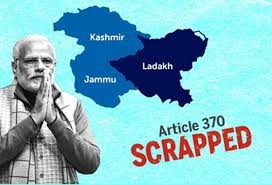SC Verdict on Article 370
The Supreme Court, in a unanimous decision, declared Article 370, which granted special status to Jammu and Kashmir, a temporary provision of the Indian Constitution. The ruling was a response to the 2019 move by the Bharatiya Janata Party (BJP)-led government, led by Prime Minister Narendra Modi.
Key Aspects of the SC Judgment
- Three Concurrent Judgments: Chief Justice DY Chandrachud stated that there are three concurrent judgments on the matter. One by himself, one by Justice BR Gavai and Justice Surya Kant, and a concurring opinion by Justice SK Kaul. Justice Sanjiv Khanna concurred with both.
- Focus on Constitutional Questions: The verdict addressed three main aspects: the validity of the Presidential order, the imposition and extension of President’s rule in December 2018, and the constitutionality of the J&K Reorganisation Act bifurcating the state into two Union Territories (UT).
- Validity of President’s Rule: The court did not adjudicate on the validity of imposing and extending President’s rule, as the petitioners did not challenge it. The court emphasized limitations on the Union’s power during Presidential rule, rejecting arguments that challenged actions of irreversible consequences during this period.
- J&K’s Lack of Sovereignty: The court clarified that J&K did not retain internal sovereignty upon accession to India. It highlighted the absence of references to sovereignty in the J&K Constitution and affirmed that the state became an integral part of India.
- Temporary Nature of Article 370: The court ruled that Article 370 was a temporary provision, citing textual evidence and marginal notes indicating its transitory nature. The Chief Justice emphasized that it was part of a gradual process of constitutional integration.
- President’s Powers Superseding Constituent Assembly: The court upheld President Ramnath Kovind’s move to issue Constitutional Order (CO) 273, removing the special status granted to J&K. It stated that the recommendation of the Constituent Assembly was not binding on the President.
- Upholding Carving Out of Ladakh: On the validity of the J&K Reorganisation Act 2019, the court, considering the Solicitor General’s submission on statehood restoration, did not determine the validity of reorganizing J&K into a UT. It upheld the carving out of Ladakh as a UT.
- Orders on Elections and Human Rights Violations: The court directed the Election Commission to conduct J&K assembly elections by September 30, 2024, and called for the restoration of statehood at the earliest. Justice SK Kaul, in his concurring judgment, recommended the establishment of a “Truth and Reconciliation Committee” to address human rights violations.
Month: Current Affairs - December, 2023
Category: Legal & Constitution Current Affairs



vinutha MG
December 13, 2023 at 7:48 amKarnatak current affairs
and central government schemes